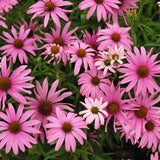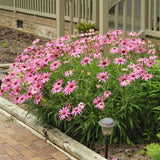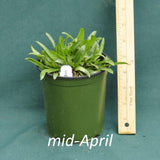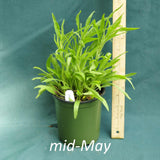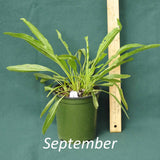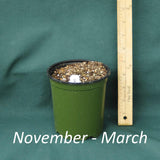Looking for a long-lived and tough coneflower for your garden? Echinacea 'Public Domain' is a coneflower selected for its resilience and early flowering.
- Easy to grow
- Drought tolerant
- Attracts pollinators
Details
- 18 to 24 in. tall and wide
- Clump-forming habit
- Perennial that goes dormant in the fall and emerges again in the spring
- Hardy in USDA hardiness zones 5, 6, 7, 8, and 9
How to grow
Plant in full sun to keep plants compact and free flowering. Prefers well-drained soil and will tolerate drought once established.
Care and maintenance
Easy to care for. Though not necessary for the health of the plant, deadheading (cutting off the old flowers) will promote more blooms.
Flowering period
In central North Carolina plants start blooming in May and can continue flowering into the fall if deadheaded after their first flush.
When to plant
Anytime the ground isn’t frozen. Will establish quickly in the summer if plants are kept watered.
Spacing
18 to 24 inches apart when planting in a group.
When will my plant flower?
Plants are flowering size and will bloom their first year.
Native habitat and range
Both species of this hybrid are native to prairie-like habitats. Echinacea tennesseensis is a rare native that only grows in Tennessee while E. purpurea grows at scattered locations throughout the eastern United States.
Source and origin
This coneflower came about from a group of self-sown seedlings in our garden, most likely a hybrid between E. purpurea and E. tennesseensis. After a decade of evaluating, we selected one plant for its durability and early flowering.
| States | Orders up to $50 | Orders $51 to $100 | Orders over $100 |
| AL, DE, GA, KY, MD, NC, OH, PA, SC, TN, VA, and WV | $16 | $18 | $20 |
| AR, CT, FL, IL, IN, LA, MA, MI, MO, MS, NH, NJ, NY, RI, VT, and WI | $18 | $20 | $22 |
| IA, KS, ME, MN, OK, and TX | $20 | $22 | $24 |
| CO, NE, ND, and SD | $22 | $24 | $26 |
Sorry, we can't ship plants outside of the continental United States or to AK, AZ, CA, HI, ID, NM, NV, OR, UT, and WA due to agriculture restrictions.
When will my order be shipped?All plants are shipped within two weeks of placing an order.
Is it okay to plant in the winter?Yes, as long as the soil is not frozen. Planting native perennials in winter and early spring gives your plants a head start before the summer heat arrives.
What if it’s too cold to plant where I live, but I want to buy a plant before it sells out?Dormant plants can safely be kept in a basement, garage, or cool room until you are ready to plant in late winter or early spring.
How will my plants get delivered?Most orders are shipped on Monday or Tuesday via UPS Ground, which depending on the destination takes between 1 to 4 days.
Are your plants shipped in their containers?Yes, all our plants are shipped in their growing containers. The majority are grown in containers that are 4.5 inches wide by 5 inches deep and 32 fl. oz. / 946 ml in volume.
Do you guarantee your plants?We guarantee our plants to be healthy, ready for planting and correctly named. We are not able to guarantee whether a plant will grow in your garden as there are too many circumstances that are beyond our control.
On rare occasions, a plant shipped dormant may fail to emerge from its dormancy. If this happens, please let us know. If you are concerned about a plant, please contact us within 14 days to let us know. If we can’t help you make it grow, we’ll send you a new plant or issue a refund.
You can return your plants if you no longer want them once they arrive. To receive a refund (minus 20% restocking fee) the plants must be returned in good condition. Return shipping is the customer’s responsibility.
Can I cancel my order?Yes, you can cancel your order. Please visit our terms and service page for details.
What about sales tax?We propagate our own plants and are not required to collect North Carolina sales tax.
Where can I find information about your plants?Here are some FAQ on how we grow plants.







